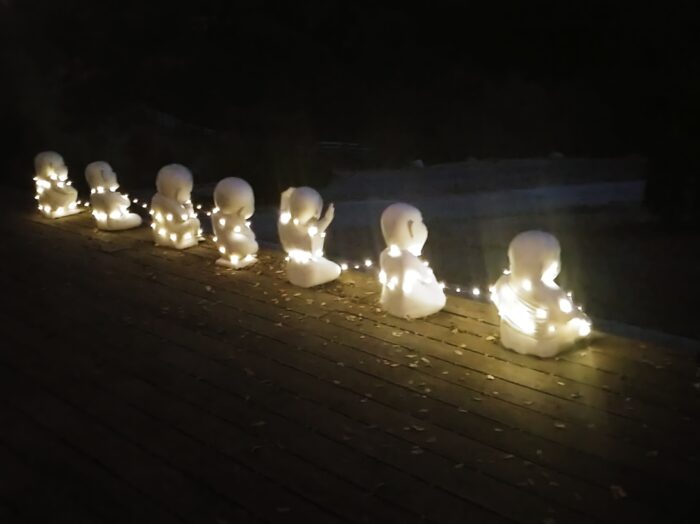
Welcome to The Art of Breathwork for Stress Relief. This weekend retreat will be a deep dive into the universe of your breath and its potential for positively affecting your health and longevity. We often take our breathing for granted and many of us are not maximizing the many potentials of the breath. In fact, there are many of us who are unaware of breathing patterns that are supporting more anxiety, and stress patterns in the body. Pranyama is a mature step on the Yogic path taking us into the subtler energies, or the pranic layer of our experience. We will practice one series of breaths, twice daily, so that you are proficient with this skill, gaining the ability to create a home practice by the programs end.
We will also examine modern stressors that lead to the everyday anxiety, fear and depression that co-create our epidemic of chronic conditions. We will offer various tools to enable us to take charge of, and greatly reduce, the stress effect in our life; pranayama, yoga asana, yoga nidra, healthy eating and lifestyle and forest bathing. This time together will offer great rejuvenation and healing for your nervous system. There will be ample time to connect to nature as we take walks through our rolling hills, visit a beautiful Sequoia grove, enjoy a soak at the hot springs as well as simple leisure time to let your body rest and repair. https://kernriversierra.com/hike/Trail_of_100_Giants.html
“Breathe. Transform. Thrive. Join our Pranayama Retreat and embark on a journey of deep healing and self-discovery. Immerse yourself in the ancient art of breathwork and unlock the immense power within you. Experience the magic of Pranayama as you learn and practice transformative breathing techniques. Discover the profound impact of mindful breathing on your vitality, inner calm, and overall well-being. Our expert instructors will guide you every step of the way, helping you deepen your practice and harness the life-force energy within. During this immersive retreat, you’ll explore the secrets of Pranayama in the serene embrace of nature. Rejuvenate your mind, body, and spirit as you release stress, tension, and anxiety. Experience the healing power of breath as you cultivate balance, strength, and inner peace.

Our retreat offers more than just breathwork. Indulge in nourishing vegetarian meals for inner purification and enjoy personal consultations with our knowledgeable instructors. Gain insights, solutions, and personalized meditation techniques tailored to your unique journey. Discover the transformative potential of Pranayama and unlock your true potential. Join our Pranayama Retreat today and embark on a path of self-realization, vitality, and growth. Breathe your way to a more empowered and fulfilling life.”
A: Pranayama is the practice of breath control in yoga. It involves various techniques that regulate and expand the breath, promoting physical, mental, and emotional well-being.
A: Pranayama techniques help activate the relaxation response in the body, calming the nervous system and reducing stress. By focusing on slow, deep breathing, pranayama promotes relaxation, balances the mind, and reduces anxiety and tension.
A: Regular practice of pranayama for stress reduction offers benefits such as decreased levels of stress hormones, improved mental clarity, enhanced emotional stability, increased self-awareness, improved sleep quality, and a greater sense of calm and relaxation.
A: Different pranayama techniques can be effective for stress reduction. Some commonly practiced ones include Nadi Shodhana (alternate nostril breathing), Bhramari (humming bee breath), Shitali (cooling breath), and Ujjayi (victorious breath). These techniques help calm the mind, balance the nervous system, and reduce stress.
A: Consistency is key when practicing pranayama for stress reduction. Starting with a few minutes each day and gradually increasing the duration is recommended. Aim for at least 10-15 minutes of regular practice, ideally performed daily, to experience the benefits over time.
A: Pranayama can be practiced by most individuals, but it is essential to practice pranayama under the guidance of a qualified yoga teacher, especially if you have any pre-existing respiratory conditions or health concerns. They can provide appropriate guidance and modifications based on your individual needs
A: While pranayama is a valuable tool for stress reduction, it is often most effective when combined with other stress management techniques such as yoga asanas (poses), meditation, mindfulness practices, and a healthy lifestyle. Integrating pranayama into a holistic stress management approach can yield greater benefits.
A: Some pranayama techniques may not be suitable for individuals with certain medical conditions or during specific stages of pregnancy. It is important to consult with a qualified yoga teacher or healthcare professional to ensure that pranayama is safe and appropriate for your specific situation.
Yoga is a holistic practice that can be incredibly beneficial for stress reduction and finding bliss. Here are some ways in which yoga helps in these aspects:
It’s important to note that yoga is a journey and a practice that unfolds over time. Consistent and regular practice, combined with self-compassion and patience, can lead to significant reductions in stress and a deeper experience of bliss.